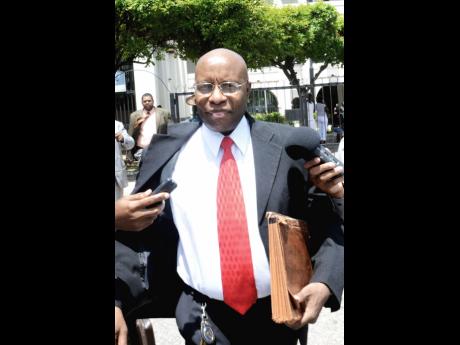The Fourth Floor | When criminal cases collapse
No one alive in Jamaica in September 2012 will easily forget the national outrage that greeted the rape of an eight-year-old girl and four others in Irwin Point, St James. Neither will one quickly forget the collective sigh of relief when it was revealed that two men would pay for the crime.
But then something went horribly wrong, and the brothers were freed midway trial. It boiled down to evidence - DNA evidence versus eye-witness evidence. The men, who maintained their innocence, volunteered to submit to DNA testing, and in the end, their DNA was not linked to any of the criminals.
Without the vantage point of the director of public prosecutions (DPP), one may never quite understand the rationale behind the director's decision to present the case, knowing beforehand that the DNA evidence would exonerate the accused men.
Adley Duncan of the DPP's office attempted to put the case into perspective recently when he joined the Fourth Floor panel to assess the reason why some high-profile cases have fizzled in the courts.
"This was a difficult call for the DPP," Duncan offered.
He explained that after the DNA results came back, the prosecutor assigned to the case went to the witnesses and told them that the DNA evidence cleared the men, but one of witnesses was adamant that these were the men who raped her.
NOT JUSTICE
He continued: "You have a vulnerable victim of a crime who wants her day in court, to say that 'these are, in fact, the men who raped me, I don't care what the DNA says'. So what we ultimately did - and it was a difficult call, and I acknowledge the criticisms - is that we gave the victim an opportunity to say what she said, which was important to her, and then we presented the scientific evidence."
"That's not right, that's not fair, that's not justice," is how venerable Queens Counsel Frank Phipps summed it up. As it turned out, a serial rapist pleaded guilty to the crime in 2015.
Hugh Wildman, former DPP of Grenada and senior prosecutor in the DPP's office, strongly disagreed with Duncan's position that having presented DNA evidence, it was okay to say, "We are not seeking a conviction in this case."
"You have to seek a conviction," insisted Wildman. "Every case that the DPP's office - or the prosecution in this country - presents, is presented on the basis that the person against whom the evidence you have led is guilty of the offence, and it is for the tribunal of law and fact to determine guilt or innocence."
It was agreed that scientific evidence will naturally trump ID evidence. In fact, eyewitness evidence has proven highly unreliable in several cases, and DNA evidence has overturned many convictions in the United States.
... DPP's office lacks application of jurisprudence and innovation - Wildman
The collapse of what became widely known as the Cash Plus case has left deeply unresolved challenges among the nearly 40,000 persons who lodged money in Carlos Hill's scheme, with the hope of cashing in on big returns. Hill's acquittal stirred many emotions, and members of the public labelled the prosecution incompetent for failing to put him on trial and secure a conviction.
In Hill's case, one of the reasons for the collapse was the absence of witnesses. Hugh Wildman, former director of public prosecutions (DPP) of Grenada and senior prosecutor in the DPP's office, feels that mistakes were made by the DPP's office in this case. He cited breaches of both the Banking and Securities acts, for which Hill should have been made to answer.
But then, as the trustee in bankruptcy for Cash Plus, Queen's Counsel Frank Phipps wanted to know why Wildman did not himself take action against Hill.
A lively exchange ensued between the two during a Fourth Floor discussion.
Phipps: Why didn't you prosecute?
Wildman: No, I couldn't prosecute. That was not my remit.
Phipps: Why didn't you retain counsel to
prosecute?
Wildman: I couldn't have done that either.
Phipps: Why didn't you retain counsel?
Wildman: We could not have done that. In fact, all of those cases are normally cases which are brought with the consent of the DPP.
Phipps: Is that so? Why didn't you ask the DPP for a fiat?
The two went at it for a while.
JUST WANTED MONEY BACK
As one of the prosecutors in that case, Adley Duncan, offered the view that most of the investors in Cash Plus just wanted their money back, and the feeling was that if Hill was convicted that would have been inimical to their objective of trying to get back their money.
Of the 40,000 reported investors, statements were collected from 14, and after the case was called up, those witnesses stopped answering their phones.
The so-called 'X6 case', involving the shooting death of a 17-year-old schoolboy, was on everyone's tongue for a while.
"Lots of Jamaicans were very upset with our office because it's a very emotional issue," admitted Duncan.
He said the media and John Public convicted Patrick Powell. He rehearsed some of the details of that case and referred to the taxi driver who had earlier given a statement identifying Powell as the shooter, but recanted in court, while alleging that he was coerced into giving the statement.
A mishandled case was Wildman's assessment of that matter. He suggested that the problem at the DPP's office is lack of application of the jurisprudence and innovation which were once associated with that office.





